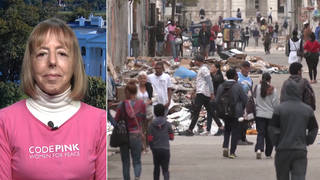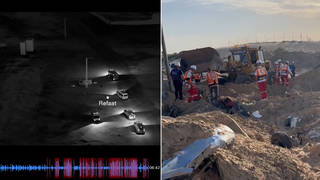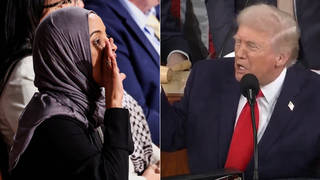
The University of California, Berkeley has provided Trump officials with the names of at least 160 students, faculty and staff in cases of alleged antisemitism on campus, in response to the administration’s sweeping crackdown on Palestinian solidarity activism. The administration has already threatened to cut off federal funding from academic institutions and has targeted international students involved in the pro-Palestine movement.
“There is no good evidence that antisemitism is rampant on campus,” says the philosopher Judith Butler, who teaches at UC Berkeley and whose name was among those shared with the Trump administration. “To take a position against genocide is certainly not an antisemitic thing to do. Most Jews are against genocide, and we were taught to be against genocide, and we were taught, as well, that 'never again' is a slogan that should apply to all people.”
Transcript
AMY GOODMAN: This is Democracy Now!, democracynow.org. I’m Amy Goodman.
We end today’s show looking at the Trump administration’s escalating crackdown on academia and free speech. University of California, Berkeley said Friday it’s provided Trump officials with the names of at least 160 students, faculty and staff, complying with a federal investigation into alleged antisemitism on college campuses.
On September 4th, UC Berkeley’s top lawyer, David Robinson, sent a letter to each person whose name and information had been shared with the federal government. The letter said, in part, the Education Department’s Office of Civil Rights, quote, “required production of comprehensive documents, including files and reports related to alleged antisemitic incidents,” unquote.
The latest comes after UC Berkeley Chancellor Rich Lyons was grilled by Republican lawmakers in Congress in July on antisemitism. This is Republican Congressmember Lisa McClain of Michigan questioning Lyons.
REP. LISA McCLAIN: So, why do you think Jewish students don’t feel safe at your university, in which you’re in charge of? Just curious.
RICH LYONS: Well, I think part of safety, for most people, some of it is physical, some of it is more — more emotional and “Am I being harassed, but not necessarily being confronted with potential violence?” So, I’ve admitted already there is antisemitism on campus.
AMY GOODMAN: That was Republican Congressmember Lisa McClain of Michigan questioning UC Berkeley Chancellor Rich Lyons in July.
The Trump administration has targeted dozens of colleges across the country, an aggressive crackdown on Palestinian solidarity activism and peaceful protests, threatening to cut off federal funding to academic institutions, persecuting, in particular, international students involved with the pro-Palestine movement. Scholars and others have likened these attacks to McCarthyism.
Last week, a federal judge in Boston handed Harvard University a victory, saying the Trump administration’s freeze on billions of dollars in federal research funding was illegal. In her ruling, Judge Allison Burroughs said she found it, quote, “difficult to conclude anything other than that [the Trump administration] used antisemitism as a smokescreen for a targeted, ideologically-motivated assault on this country’s premier universities, and did so in a way that runs afoul of [federal law],” the federal judge wrote.
For more, we’re joined here in New York by Judith Butler, philosopher, political commentator, gender studies scholar. Judith Butler is among the UC Berkeley faculty whose names were handed over to the Trump administration. They’re a distinguished professor in the graduate school of the University of California, Berkeley and the Hannah Arendt chair at the European Graduate School. They’re on the Academic Council of Jewish Voice for Peace. Judith Butler is the author of numerous books, most recently, Who’s Afraid of Gender? And their new piece in The Chronicle of Higher Education is titled “When Universities Become Informants: A practice from the McCarthy era makes an ugly return.”
Welcome to Democracy Now! It’s great to have you with us. So, your name is one of 160 that Cal, that UC Berkeley, handed over to the Trump administration?
JUDITH BUTLER: Yes. It’s good to be here, Amy. And thank you so much for the coverage of Gaza that you’ve been providing so consistently from October 7th on and before. And it’s extremely important for all of us that you continue to do so.
Indeed, Gaza is the background for this particular issue at UC Berkeley, because the students, the faculty, the staff who have opposed genocide or who have supported Palestinian rights and freedoms have been consistently accused of antisemitism, even though there is no good evidence that antisemitism is rampant on campus. To take a position against genocide is certainly not an antisemitic thing to do. Most Jews are against genocide, and we were taught to be against genocide, and we were taught, as well, that “never again” is a slogan that should apply to all people.
So, but a genocide can’t take place without suppressing political speech and without suppressing educational efforts that will explain what genocide is and how it’s happening now. So, part of what we’re seeing is the accusation of antisemitism being used as a cudgel to suppress speech, to threaten people. And it is, of course, appalling to me as a UC Berkeley faculty member who put 30 years into that institution, or almost, to see that the administration would hand over names and files, when we, ourselves, many of us, at least, most of us, have never been apprised of the allegation. We still don’t know what the allegation is. We don’t have any access to the file. So the internal —
AMY GOODMAN: Was it the first time you learned that your name was handed over, on Friday, when you got the letter —
JUDITH BUTLER: Yes.
AMY GOODMAN: — from the Cal lawyer?
JUDITH BUTLER: Yes, it’s the first time I learned that there might have been an allegation against me. And I still don’t know what the allegation is. So, some students have gone through investigations. They know what the allegations are. And their files were forwarded. But most of us learned that there is an allegation, that it was forwarded, and we also learned that we have never known what the allegation is. We still don’t know. We have no right to know. And the reason for that is that the internal protocol of the University of California — it has an Office for the Prevention of Harassment and Discrimination — it stopped, ceased — it ceased to operate in light of this investigation. This investigation from the Department of Education took precedence over internal protocols, so we don’t have any rights to know the allegation against us.
AMY GOODMAN: And how does it put you at risk?
JUDITH BUTLER: Well, I am probably less at risk than most of the other people who are named, which is one reason I’ve gone public with this. But there are students named who are international students, who are on visas. There are lecturers named who do not have protections under academic freedom, who also sometimes are on visas. They can be detained. They can be abducted. They can be — as we know from Tufts, from Columbia, they can be stopped on the street. They can be detained. They can be deported. They can be — they can lose their job. They can lose their place in the university, become expelled.
AMY GOODMAN: I wanted to play a clip before the end of the show, I mean, the coming together of all of what happened last week, the assassination of Charlie Kirk. In late May, he posted this exchange with a student on his official YouTube channel.
CHARLIE KIRK: The humanities, as they’re configured, are wretched to the core with anti-Western teaching, anti-American literature.
STUDENT: What do you mean, “anti-Western teaching”? What —
CHARLIE KIRK: An emphasis on Herbert Marcuse and Angela Davis and Kimberlé Crenshaw —
STUDENT: What’s wrong with Angela Davis?
CHARLIE KIRK: — and Judith Butler and — what? — Derrick Bell.
STUDENT: What’s wrong with Angela Davis? She’s a great woman.
CHARLIE KIRK: What? Angela Davis?
STUDENT: Yeah.
CHARLIE KIRK: The outspoken, vocal communist?
STUDENT: Yeah.
CHARLIE KIRK: She’s a great woman?
STUDENT: Yeah.
CHARLIE KIRK: OK, wow. Yeah, that’s why kids shouldn’t go to college, to learn from communists.
AMY GOODMAN: That was Charlie Kirk, who we just have 30 seconds for your response.
JUDITH BUTLER: Well, I’m very proud to be put in a club with Angela Davis and Kimberlé Crenshaw. I mean, that’s just beautiful. And I — you know, I stand by them. And hopefully, we’re all able to continue educating and lecturing without further political repression.
AMY GOODMAN: I want to thank you, Judith Butler, for being with us. We’re going to do Part 2 after the show and post it at Democracy Now! Judith Butler is a philosopher and professor at the University of California, Berkeley. We’ll link to their new piece in The Chronicle of Higher Education headlined “When Universities Become Informants: A practice from the McCarthy era makes an ugly return.”
That does it for our show. Very happy birthday to Sam Alcoff! Democracy Now! produced with Mike Burke, Renée Feltz, Deena Guzder, Messiah Rhodes, Nermeen Shaikh, María Taracena, Nicole Salazar. I’m Amy Goodman.











Media Options